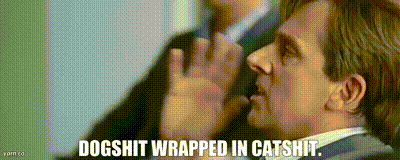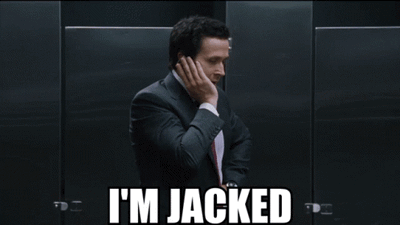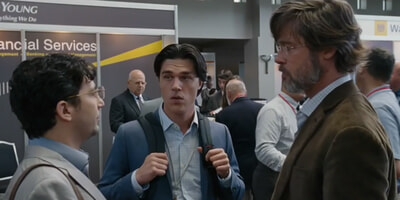2025.04.DisappearingMoment
If someone at your gym offers you unsolicited advice, ignore it. Anyone who knows their shit keeps it to themselves. Even if you ask them for guidance, they turn into jacked rabbis. “Bigger arms? Nu?! Already with the swollen biceps?! Oy, such tsuris!”
(Editor’s Note: I’ve never met anyone who speaks this way. It may be a Hollywood invention.)
That’s how I feel about most advice. Especially financial advice. And yet.
One of the ways I express love is by helping people and organizations with their finances. Money is terrifying and, for now, necessary. Reducing stress, making things workable, feels tangible. Something to complement our other efforts to increase equity.
For me, at this moment, investing is something like Pascal’s Wager. While I don’t expect to see anything resembling the rule of law or fair elections, there’s no way to invest under autocracy. From a personal finance perspective, the best I can do is bet everything on something I don’t expect to happen. To base my analysis on unexpected grace.
None of which implies a thriving stock market. I can’t imagine the U.S. stock market being stronger in two years than it is now. Specifically, I don’t expect money left in the U.S. stock market for two years to have more buying power than it does now. I expect poor returns and high inflation. If either is true, we’ll have a buying power problem. The dollar you invest in the S&P 500 today would buy less in two years than it buys now.
In the Personal Finance section below, I describe what I’ve done this month. I also bought Innovator 100% Buffer ETF for my mother. If the Remaining Buffer (sortable) exceeds 100% by enough (the buffer increases when the S&P 500 declines), a Buffer ETF might work for you. Do your research on this one.
Speaking of doing your research, I’ll repeat what I wrote last month. None of this is investing advice. Never make an investment based on what you read in this newsletter. Or any newsletter. I know you and you know better.
I have shared this information because I want to be transparent. Writing helps me think through the implications of my beliefs. Maybe what I’ve written will help you.
If you feel confident in U.S. markets and America, this could be an opportunity for you to adjust your allocations. If you don’t, you might think about what that means for your finances.
Welcome to April 2025’s Disappearing Moment, an inventory of my experiences. I hope you enjoy it.
Podcasts
The Memo by Howard Marks (I Liked It): It’s good to be reminded what an investor who has seen it all has seen, and what they haven’t.
Social Radars (I Liked It): It feels like a Depression-era film, an escape into the ease of opulence and wit.
Nerdy Software
The Unsure Calculator is my kind of design. The familiar with a twist. Probability, like vaccines, making us more robust.
Free Font
Bougie Products
We bought a microchip cat feeder. It opens only for the kittens; our senior cat can't get to their food. Fiddle, fiddle, burn, Rome, burn.
Personal Finance and Investing
I wrote about Gotham Short Strategies last month. This month, we added AQR Long-Short Equity Fund. I like AQR founder Cliff Asness’s writing.
Reading
Ethan Marcotte, “Magick images” (I Liked It): This inspired another easter egg for my website. If you start to share one of my website posts on social media, you’ll see what I mean.
Scott Patterson, The Chaos Kings (2024) (I Liked It): We can find truth in conflicting ideas if we notice where they are incomplete. Cf., Tune Out the Noise.
Kōdō Simone, “What If We Made Advertising Illegal?” (Worth My Time): I live in the world Simone proposes. Thanks to technology and personal choice, I don’t experience advertising. Privilege is comforting.
Timothy Snyder, On Tyranny (2017) (I Liked It): A useful primer. Would that it weren’t.
Cassandras and Short-Sellers and Bears, Oh My!
“Wall Street indexes predicted nine out of the last five recessions!”
Paul Samuelson
“I learned in the early 1970s is that ‘being too far ahead of your time is indistinguishable from being wrong.’”
Howard Marks
“Things that have never happened before are bound to occur with some regularity. You must always be prepared for the unexpected, including sudden, sharp downward swings in markets and the economy. Whatever adverse scenario you can contemplate, reality can be far worse.”
Seth Klarman
“People have for much of this decade let greed overcome fear as their principal financial emotion. When the next fear-inspired panic occurs, investors' finger-pointing will almost certainly be aimed outward, while a good part of the blame should instead be directed inward.”
Seth Klarman (The Bond Buyer, 1989-10-23)
Lakshman Achuthan co-founded the Economic Cycle Research Institute. He tells you when “a recession really is coming”.
Storied short-seller Manuel P. Asensio wrote Sold Short: Uncovering Deception in the Markets.
Roger Babson: “Wise investors will pay up their loans and avoid margin speculation at this time because a ‘crash’ of the stock market is inevitable. Roger Babson, statistician, said today before the sixteenth National Business Conference at Babson Park, Wellesley.” (New York Times, 1929-09-05)
Dean Baker co-founded the Center for Economic Policy Research. In 2002, he wrote, “It was easy to see both the bubble and the problems that would result from its inevitable collapse, and some economists did raise warnings (e.g. Baker, 1997, 1998, 2000a, 2000b; Diamond, 1999; and Shiller 2000)…. Yet, the vast majority of economists and economic analysts completely ignored the stock bubble in the late nineties…. In short, the imminent disappearance of close to $10 trillion… prompted little interest among economists.”
Patrick Bolton sees green swans.
Michael Burry, as played by Christian Bale in The Big Short

Miguel Angel Centeno founded the Research Community on Global Systemic Risk and was lead editor on How Worlds Collapse.
James Chanos “is best known for his bets against energy trader Enron many months before the company's December 2001 bankruptcy amid an accounting scandal.”
In 1999, Anthony Deden (now the Chair of Edelweiss Holdings, publisher of Edelweiss Journal), wrote, “what we are witnessing is, indeed, history’s greatest financial bubble. The indescribable financial excesses, the massive increase in debt, the monstrous use of leverage upon leverage, the collapse in private savings, the incredulous current account deficits, and the ballooning central bank assets….”
“When hedge-fund manager David Einhorn publicly sets his sights on a company, other investors often respond, especially if they believe he is betting that a stock will tumble.” (Juliet Chung, Joe Light, and Tom McGinty, “A Mighty Wind: Sizing Up Fund Manager's Sway,” Wall Street Journal, 2012-09-18)
Steve Eisman, as played by Steve Carell in The Big Short

In 2024, he was put on administrative leave from his employer for his response to a video “showing burning tents of displaced Gazans after an Israeli airstrike, which was captioned, ‘Screams of Palestinians being burnt alive. A holocaust is happening before our eyes and the world is silent." Eisman’s response was, "You must be kidding. We are not silent. We are celebrating."
James Grant makes permabears seem bullish.
Jeremy Grantham makes James Grant seem bullish.
Robin Greenwood “did some work on trying to predict the end of bubbles. As an example, bubbles aren’t just periods where prices have gone up a lot. They’re also periods with a lot of volatility, a lot of trading volume, measures of speculation, issuance, and so on. We were trying to capture those things and ask: ‘Can you use that other data beyond just the prices to forecast what’s going to happen?’”
“In recent years, our most reliable measures of stock market valuation have pushed beyond their 1929 and 2000 peaks, and I’ve described the period since early 2022 as the extended peak of the third great speculative bubble in U.S. history. In my view, that process is now complete. The stock market faces severe downside risk ahead, and the U.S. is constrained in the unsystematic monetary and fiscal expansion that both amplified that bubble and fueled record but wholly impermanent corporate profit margins. Meanwhile, the U.S. economy now faces an imminent recession, and if we fail to be vigilant, we, once united Americans, risk losing what is far greater and more valuable than money.” (John Hussman, “Humpty Dumpty Was Pushed,” Hussman Market Comment, 2025-04-03)
In 2023, Nate Anderson pulled the flexiest of flexes. His Hindenburg Research shorted legendary corporate raider and short-seller Carl Icahn. Busted.
Paul Tudor Jones made a name for himself when he profited from Black Monday in 1987, Japan’s market downturn in 1990, and the dot com bubble bursting in 2001.
“Joseph Kennedy, father of John F., et. al, made his fortune in part by liquidating stocks right before the crash” (of 1929).
Former JPMorgan chief market strategist, Marko Kolanovic, “offers ample evidence in support of the old quip that pessimists are never wrong, but sometimes they’re early.”
Greg Lippmann, as played by Ryan Gosling in The Big Short

STATEMENT OF ROBERT B. LITTERMAN, PHD, CHAIR, CFTC CLIMATE-RELATED MARKET RISK SUBCOMMITTEE CONCERNING "Climate-Related Economic Risks and Their Costs to the Federal Budget and the Global Economy" DELIVERED TO UNITED STATES SENATE COMMITTEE ON THE BUDGET, FEBRUARY 15, 2023
Jesse Livermore made $100M shorting the U.S. stock market in 1929.
James Mai, Charlie Ledley, and Ben Rickert (Cornwall Capital) were played by Finn Wittrock, John Magaro, and Brad Pitt in The Big Short

Humphrey B. Neill wrote The Art of Contrary Thinking.
Joseph Norman, lead author of “Systemic Risk of Pandemic Via Novel Pathogens – Coronavirus: A Note” (2020-01-26)
Crispin Odey shorted banks in 2008 and he was notably bearish at times. He is notably vile always.
In 2007, John Paulson bet against subprime mortgages and earned almost $4B.
Ann Pettifor is one of the people who predicted the 2008 financial crisis.
In 2021, Gabe Plotkin’s Melvin Capital shorted GameStop, oops.
Fahmi Quadir started Safkhet Capital, a short-only hedge fund, when she was 26.
Carmen Reinhart, former Chief Economist for the World Bank, was lead author on “The Crisis Next Time: What We Should Have Learned From 2008” and This Time Is Different: Eight Centuries of Financial Folly.
Julian Robertson made short-selling cool, “helping to create the modern hedge fund industry”.
David Rosenberg “has long been one of the more bearish strategists on Wall Street.”
Nouriel Roubini, “Dr. Doom,” wrote MegaThreats and Crisis Economics.
Robert Shiller wrote Irrational Exuberance (2000). His website designs demonstrate why some people thought MySpace was an improvement.
Didier Sornette wrote Why Stock Markets Crash, along with “Dragon-Kings, Black Swans and the Prediction of Crises” and scores of other light reads.
In 1992, George Soros bet that the British pound would crater. The Bank of England bet that it wouldn’t, oops, righto, Bob’s your uncle, George’s your daddy.
I think I might not like Mark Spitznagel. And I would love to invest in Universa, the fund that he founded and runs.
Nassim Nicholas Taleb is heralded for his hesitancy and humility.
Legendary investor John Templeton shorted tech stocks before the dot com bubble burst. “This is the only time in my 88 years when I saw technology stocks go to 100 times earnings…. It was insane, and I took advantage of the temporary insanity."
Christian Upper writes about financial crises, economic contagion, and related kink.
Bernard von NotHaus is bearish on… the Federal Reserve. Duuude, like, what if we all got stoned and made our own money… and a Free Marijuana Church.
In The Big Short, Meredith Whitney was played by…. Right. No one.
In The Big Short, a fictionalized Eugene Xu was played by Stanley Wong.

Brandon Yarckin, Chief Operating Officer at Universa Investments, “can say definitively that the market is susceptible to a collapse.”
Felix Zulauf “does not consider himself a permabear, a moniker that has stuck with him since his call on the 1987 crash.”
Thank you for spending a few moments with me. I appreciate you and look forward to corresponding again next month.
Brett
Want to discuss any of the topics in this newsletter or anything else with other Disappearing Moment readers? Please sign up for Perpetual August. I think it might be fun.